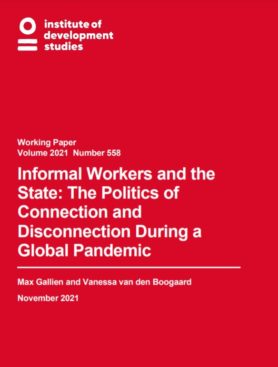Volume 2021 558
In low- and middle-income countries, informal workers are particularly vulnerable to the health and economic effects of the Covid-19 pandemic and often neglected by policy responses. At the same time, the crisis is rapidly changing the ways that states engage with informal workers. We argue that the relationships between informal workers and states – and the politics of creating and accessing these linkages – are a critical and frequently overlooked part of the politics of the pandemic. Both pre-existing structural disconnection from the state—embodied, for example, through limited access to health infrastructure—and state attempts to build new connections, including through cash transfer programmes for informal workers, have a profound impact on the effectiveness and reach of state crisis responses. Without considering the varied and dynamic nature of the linkages between states and informal workers we cannot understand the heterogeneous health and economic impacts of the pandemic, state capacity to respond to the crisis, or institutional change in the context of crisis.
